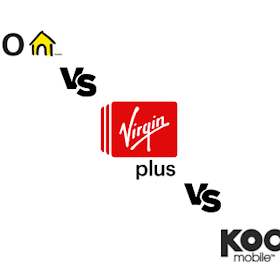
Canada's geography, like its citizens, is diverse. One in six Canadians lives in rural areas where fibre optic cable installations are prohibitively expensive. Rural internet providers offer these remote customers unique solutions that deliver reliable connectivity.
Our picks for the best Canadian rural internet providers include Xplornet, Starlink, Bell, Rogers, SaskTel, and Telus. We've scoured all the best cable, fibre optic, DSL, wireless, and satellite internet plans, analyzing the speed, reliability, and price offered by each provider so you can make an informed purchase.
Read on to find the best rural internet service providers in Canada.
How we picked the best rural internet providers
-
Price & value
We ensured you’re getting the most bang for your buck without sacrificing on the essentials to keep you connected. -
Speeds & data
We looked at whether the upload and download speeds were reasonable for the plan price and flagged if you’re being overcharged for services and data you likely don’t need. -
Coverage & network reliability
We evaluated each carrier’s coverage maps and availability per province. -
Plan extras and perks
If you get a free modem or streaming subscription, we factored those in relative to the cost of the plan.
You can read more about our detailed methodology below.
Rural internet service providers in Canada
Hundreds of companies provide telecommunications to remote communities throughout Canada. Our favourite internet providers—included below—offer the widest range of services for rural internet in Canada.
Xplore rural internet
- Pros: Large rural coverage map, affordable plans
- Cons: Limited hardware services, inconsistent service
Our favourite rural internet provider is Xplore. The company offers extensive coverage with its independent 4G LTE network and WiMAX fixed wireless towers. Xplore also offers consumer satellite internet service almost everywhere in Canada that its wireless network can’t reach. Looking to the future, Xplore is continuing to install fibre optic and 5G services to select communities, further improving rural internet infrastructure.
Xplore is available in every province throughout Canada, though you'll need to confirm your particular address to make sure service is available where you live.
Starlink internet
- Pros: High-speed satellite internet, flat rate
- Cons: High upfront cost, inconsistent service
Starlink internet, the high-speed satellite provider from Elon Musk's SpaceX, is now available throughout all of Canada. While the service is still new, we were impressed with its performance and accessibility. Check out our extensive review of Starlink internet to learn more.
Bell rural internet
- Pros: Large coverage map, affordable fixed wireless
- Cons: Expensive premium plans
Bell Canada also offers a large variety of rural internet options, including fibre optic, DSL, fixed wireless, and mobile hotspot. As one of the largest participants in the Broadband Fund, the government's investment in internet for rural areas of Canada, Bell installs fibre optic cable in small, remote communities and builds wireless broadband towers. Bell’s fixed wireless service is comparable in price to the competition, but its premium mobile phone plans are among the most expensive in Canada. Satellite TV service is also available through Bell, but not satellite internet.
Bell internet is available in Ontario and Quebec.

Rogers rural internet
- Pros: Affordable prices, unlimited data
- Cons: Limited coverage area
The demand for high-speed internet in rural Canada spiked with the pandemic lockdown in 2020, so Rogers launched its wireless home broadband service. The service launched in southwestern Ontario and expanded to include western Canada. Investments fueled by the federal government’s Broadband Fund helped Rogers connect Canadians in smaller communities. Rogers also offers cable internet and mobile hotspot telecommunications services.
Rogers internet is currently available in Ontario.
Telus rural internet
- Pros: Fast wireless, affordable plans, great coverage in B.C., Alberta, and Quebec
- Cons: No service outside western Canada or Quebec
Telus operates the fastest, largest, and most reliable cellular network in Canada, so it’s no surprise it leveraged that technology to provide rural internet service. The company is among the first to offer 5G internet service in the home. It also provides high-speed internet over fibre optic, DSL, and mobile hotspot. Telus should be the first call for rural Canadians living in B.C., Alberta, and Quebec because of wireless download speeds up to 100Mbps and some of the most affordable wireless internet plans available anywhere.
Telus internet is currently available in Alberta, British Columbia, and Quebec.
SaskTel rural internet
- Pros: Best coverage in Saskatchewan, great customer service, bundling deals
- Cons: Limited to Saskatchewan, wireless can be slow
SaskTel is the largest communications provider in Saskatchewan and scores high in customer satisfaction. SaskTel's fusion internet plans are the best choice for rural Canadians without hardwired internet access. Even though the monthly rates can be expensive, bundling an unlimited voice and data cell phone plan reduces the cost and increases your full-speed data cap.
SaskTel internet is only available in Saskatchewan.
Rural internet types in Canada
In the city, most households can choose from cable internet and fibre-optic. Both choices offer downloads up to gigabit speeds for around $100/month. Out in the country, you may have fewer affordable options, but the four most common internet technologies deliver high-speed internet throughout rural Canada. Read on to learn about the internet connection options in rural areas.
Canadian internet consumers must balance their needs between a reliable internet connection, high-speed downloads, and affordable monthly rates. Nowhere is this truer than in rural Canada, where the choices are severely limited to whatever service is available. As of 2023, only 62% of rural communities have reliable broadband access to the internet. However, government incentives through the Broadband Fund compensate internet providers for installing broadband connectivity for all Canadian households, despite the cost.
The Canadian government funds broadband network installation to remote communities across the country, closing the digital divide between connections available to urban and rural Canadians. This effort aims to bring high-speed internet service to 95% of all Canadians by 2026 and 100% of rural Canadians by 2030. The Broadband Fund pays for prohibitively expensive installation of fibre optic and wireless connectivity so everyone can be connected with an affordable plan no matter where they live.
Compare Rural Internet Technologies
| Technology | Reliability | Speed | Price | Rural availability |
|---|---|---|---|---|
| Cable |
|
|
|
|
| Fibre optic |
|
|
|
|
| DSL |
|
|
|
|
| Mobile hotspot |
|
|
|
|
| Fixed wireless |
|
|
|
|
| Satellite |
|
|
|
|
DSL (Digital Subscriber Line)
Pros: Reliable performance, affordable, some ISPs offer live TV packages
Cons: Slower speeds, not available in many rural areas
ISPs: TekSavvy, VMedia, Telus, Bell, Altima, SaskTel
You can subscribe to DSL almost anywhere there’s a phone line. That covers many farms but not necessarily recreational properties like cottages or cabins. Bad weather doesn’t affect your download speeds on DSL, making it the most reliable option. Maximum download speeds are limited to 50Mbps, and upload speeds normally peak at 10Mbps. That’s fast enough to stream shows in high definition and play online video games.

Mobile hotspot
Pros: Fast speeds, affordable, nationwide coverage
Cons: Inconsistent speed, susceptible to bad weather, low data caps
ISPs: Telus, Fido, Virgin Plus, Koodo, Public Mobile, Chatr, Fizz, Bell, Rogers, Videotron, SaskTel, Freedom Mobile
Many Canadians immediately think about using a cell phone when no internet or Wi-Fi is available. With this service, you can connect a laptop or tablet computer to your iPhone or Android smartphone through a wireless hotspot and download at 100Mbps or faster. New 5G networks will also further improve speed and range.
A mobile hotspot offers the easiest setup so long as you can get a good signal, but even the most expensive smartphone plans include data caps. Cell phone carriers with unlimited data plans may throttle data to limit your internet performance and reduce stress on the overall network. Feel free to watch TV shows and movies on unlimited 4G LTE and 5G plans, but throttled mobile data connections are only fast enough for basic browsing and streaming music.
Fixed wireless
Pros: Reliable performance, good coverage in rural communities
Cons: Slower speeds, expensive, low coverage outside rural communities
ISPs: Xplornet, Bell, SaskTel
Fixed wireless is similar to cellular internet in that you connect wirelessly to a broadcasting antenna. The price is about the same, and the connection is more reliable and with lower latency. Those features are very useful when streaming video or hosting a video meeting. Overall, download speed isn’t better than cell signals—typically around 25Mbps.
Fixed wireless towers must be present within 15 km of your location, so their coverage area is smaller than cell phone service. However, the performance and reliability make it a valuable option, especially for business use.

Satellite internet
Pros: Large coverage map
Cons: High latency, weather issues, high upfront costs
ISPs: Xplornet, Starlink
Rural Canadians have enjoyed satellite TV in every corner of the country for decades. It makes sense since satellites can broadcast to just about anywhere that sees an open sky. However, satellite internet requires two-way communications, making the service difficult to set up and far more expensive to operate. Most satellite internet providers in Canada work exclusively with commercial accounts because of these costs. Residential satellite internet service is still quite expensive, with slow transfer speeds and low data caps
Compared to any other form of internet connectivity, satellite ranks last—except in coverage area. New low-orbit satellite networks, like Elon Musk’s Starlink, promise faster transmission speeds and more affordable rates. While modern satellite internet is only fast enough for basic web browsing, these next-generation options offer download speeds fast enough to stream 4K video.

Rural internet near you
Knowing more about the different home broadband technologies and internet providers is great—unless they’re not available where you live. Use WhistleOut Canada’s exclusive search tool to find internet availability by postal code.
Rural Interent Providers by Province and Territory
-
 Alberta
Alberta
Rural Internet -
 British Columbia
British Columbia
Rural Internet -
 Manitoba
Manitoba
Rural Internet -
 New Brunswick
New Brunswick
Rural Internet -
 Newfoundland
Newfoundland
Rural Internet -
 Northwest Territories
Northwest Territories
Rural Internet -
 Nova Scotia
Nova Scotia
Rural Internet -
 Nunavut
Nunavut
Rural Internet -
 Ontario
Ontario
Rural Internet -
 Prince Edward Island
Prince Edward Island
Rural Internet -
 Quebec
Quebec
Rural Internet -
 Saskatchewan
Saskatchewan
Rural Internet -
 Yukon
Yukon
Rural Internet -
 Canada
Canada
Rural Internet
Methodology: How WhistleOut rates internet plans
WhistleOut evaluates internet plans based on the following criteria:
- Price & value: Not all cheap plans are “bad,” and not all expensive plans are worth it. We look at everything a plan includes and compare it both to other plans from the same provider, as well as similar plans from competitors in the market, to determine whether the value is consistent with the price.
- Speeds & data: Faster upload and download speeds usually mean a better user experience, but not every household needs the fastest plan available. Additionally, the more guaranteed high-speed data the plan includes, the better the plan—but there’s also usually a limit to how much you actually need, and we ensure that you’re not overpaying for services or data that will go unused.
- Coverage & network reliability: The breadth of an ISP’s network determines your reception and service. We value ISPs with large coverage maps who can provide quality internet to more Canadians.
- Plan extras and perks: In addition to the basics—speeds and data—some plans throw in freebies like modems, installation, entertainment subscriptions, or service discounts.
Our internet experts leveraged proprietary data and real-world customer feedback to evaluate the best rural internet providers, analyzing their coverage, cost, and plan options. We considered plan-specific elements, including perks, premium data allowances, and upload/download speeds.
Looking for more options for your next internet plan? Be sure to check out our guides to the best internet service providers and the best internet plans in Canada.
Best rural internet providers in Canada: FAQs
Related Articles
Find Better Phones and Plans
Hundreds of cell phone plans unpacked. All the facts. No surprises.













































